6 strategies for growing partnerships in the Black community from The Fayetteville (N.C.) Observer
Beth Hutson, The Fayetteville Observer,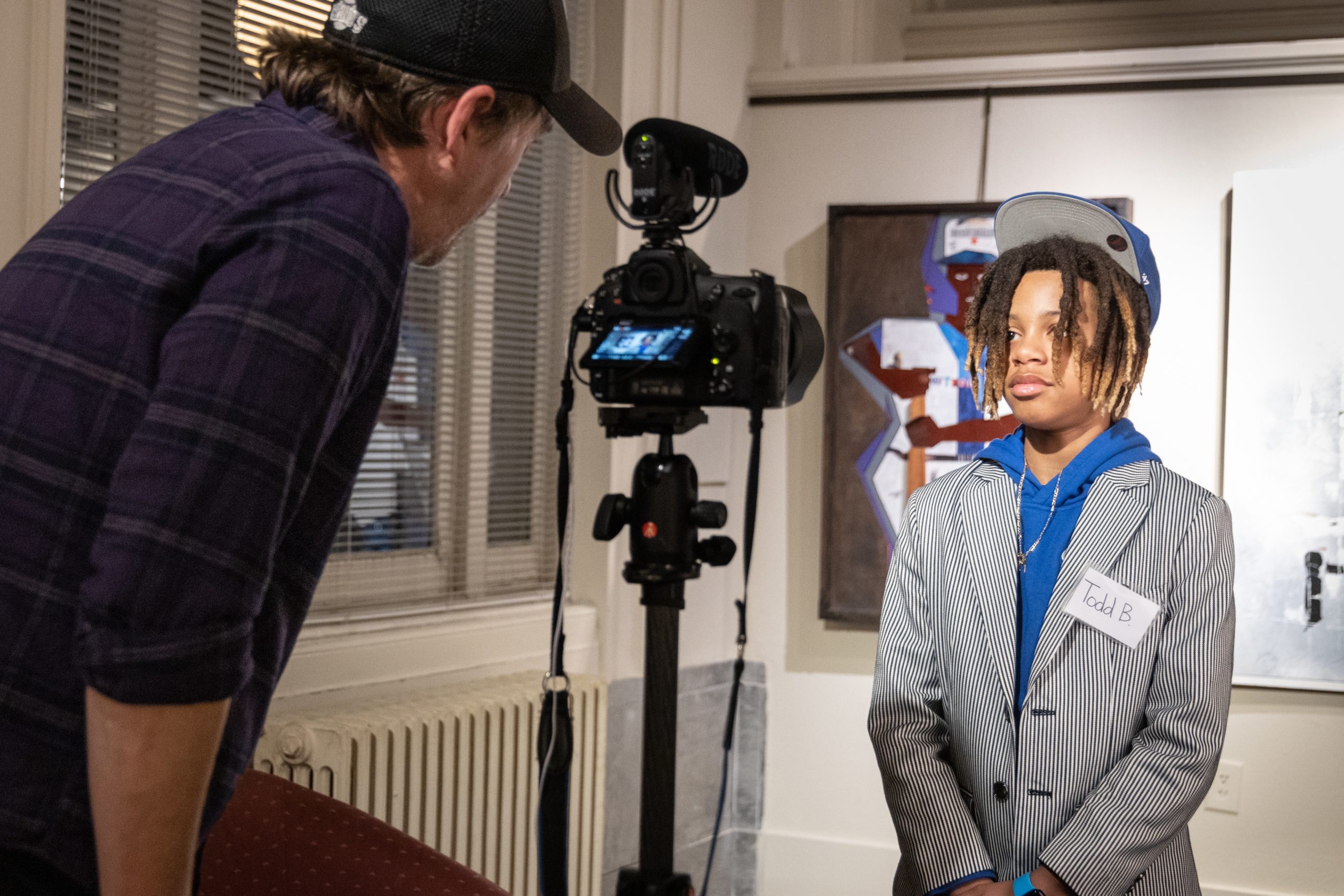
Todd B., one of The Fayetteville Observer's 2023 Future Black History Makers, has a video interview with Observer Senior Photographer Andrew Craft during a reception on Thursday, Jan. 26, 2023, at The Arts Council of Fayetteville/Cumberland County. Todd is one of 28 children being highlighted by the Observer during Black History Month as a Future Black History Maker. (Paul Woolverton/The Fayetteville Observer)
Here’s an idea to steal and adapt: Use several approaches, including audience roundtables, mobile newsrooms and source audits, to rebuild trust and engage with the Black community, whose achievements have often been ignored or downplayed by local news organizations.This is a series on Better News to a) showcase innovative/experimental ideas that emerge from the Knight-Lenfest Newsroom Initiative and b) share replicable tactics that benefit the news industry as a whole. This “win” comes from Beth Hutson, news director of The Fayetteville (N.C.) Observer, which participated in the UNC-Knight Foundation Tables Stakes program in 2021-22.
Question: What problem were you trying to solve, and why was it strategically important to your organization?
Answer: As a more than 200-year-old institution, The Fayetteville Observer hasn’t always done right by Black residents in its coverage area.
In some cases — publishing advertisements for enslaved people — we’ve contributed to actual harm. Other examples over the decades include focusing on crime coverage while downplaying or ignoring achievements and other aspects of life within the Black community.
As our area grows in diversity, we knew deepening and broadening our engagement with Black residents was not only the right thing to do from a moral standpoint, but also a smart thing to do if we wanted to continue to grow our readership.
To that end, we came up with a challenge statement that we felt perfectly encapsulated our goals: We will strive to earn the trust of Black residents, whom we’ve neglected in the past, by providing essential news, content and experiences that are worth paying for and useful in their lives.
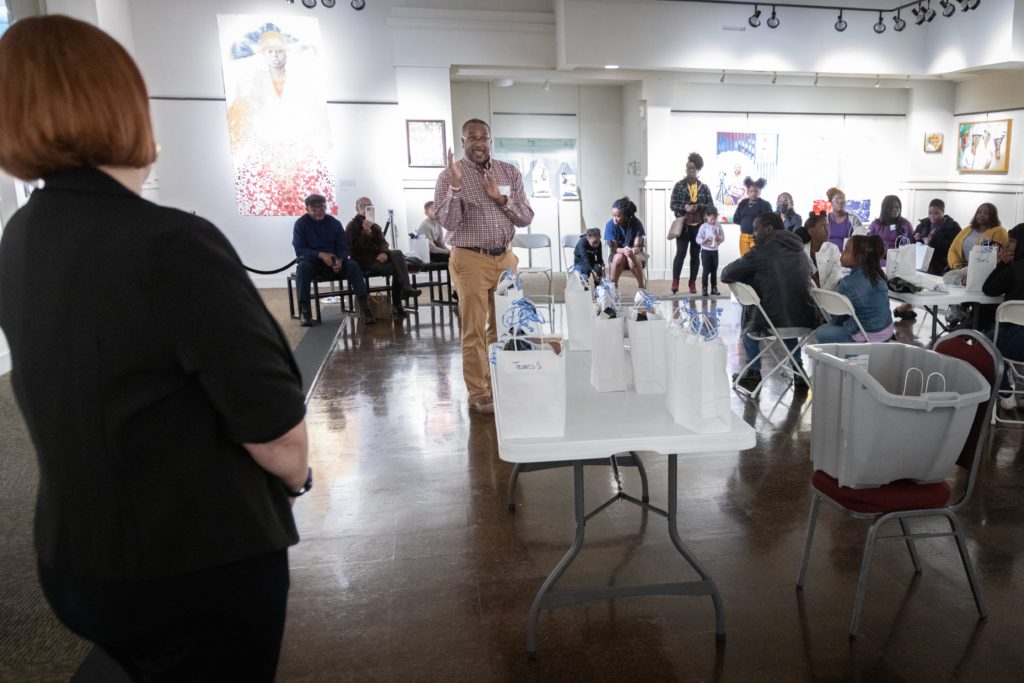
Fayetteville Observer Opinion Editor Myron B. Pitts speaks to families during the Observer’s reception for its 2023 Future Black History Makers. (Andrew Craft/The Fayetteville Observer)
Q: What strategies helped you make partnerships possible in Black communities?
A:
1. Audience roundtables: We ramped-up engagement efforts with a series of virtual audience roundtables, where we asked participants what kinds of stories they’d like to see from the Observer, what we’re already doing right and where we need to improve. Those conversations proved fruitful and led to reporting on topics that weren’t previously on our radar. One of those stories was about the plight of Savoy Heights residents to preserve the legacy of the historically Black neighborhood.
2. Mobile newsrooms: Two successful mobile newsrooms were another crucial part of building relationships. Staff members worked out of recreation centers in different neighborhoods for a week during each of those mobile newsrooms and invited the community to stop by to share thoughts and offer feedback. In addition to learning about topics readers would like to see us cover, we also were able to widen and further diversify our source list.
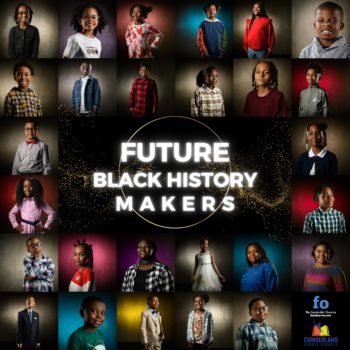
The Fayetteville Observer’s Future Black History Makers (Andrew Craft/The Fayetteville Observer)
3. One-on-one meetings: We reached out to several organizations to have one-on-one conversations about how we could work together. Two of those conversations in particular led to successful partnerships. Something we heard time and again in our conversations with community members was the need to highlight Black excellence, particularly impressive young people. One of our most well-received projects in recent memory was tied to our efforts to reach and serve the Black community.We partnered with Cumberland County Schools on our Future Black History Makers series, highlighting 28 standout elementary school students throughout Black History Month 2023.
We also worked with the Arts Council of Fayetteville-Cumberland County to give the History Makers a first look at “Soul & Spirit,” a Black History Month art exhibition exploring Black joy and featuring nationally recognized artists.
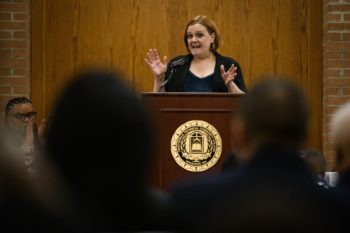
Fayetteville Observer News Director Beth Hutson speaks at the Dr. Martin Luther King, Jr. Memorial Park Banquet and Black History program in 2023. (Andrew Craft/The Fayetteville Observer)
The students were also honored by the Fayetteville-Cumberland County Dr. Martin Luther King Jr. Committee at its annual banquet; some of them were featured in separate interviews on radio station WIDU; and they each received a letter of congratulations from state Sen. Val Applewhite.
We plan to make this an annual project to continue our efforts to better serve Black readers. A number of people have expressed that they would like the series to include middle school and high school students, as well.
Another key partnership, with local news and gospel radio station WIDU, has proven to be beneficial for both organizations. We collaborated on our election coverage and now host a biweekly show, The Fayetteville Observers, on the radio station. We’re particularly proud of our work to cultivate this renewed relationship because previous Observer leadership had made promises to the station it hadn’t kept, and there had been a breakdown in communication between our two organizations.
4. Source audit: We knew we couldn’t be successful without including our staff in our efforts. We conducted a source audit so that reporters could get a clearer picture of who they might be missing in their reporting. Our audit found that our sources were racially diverse and closely mirrored the population of our county. What surprised us, however, is that our sources were slightly more likely to be men than women. We shared our findings with the staff and asked that they be more mindful when it came to gender diversity. I expect our next audit to find that we’ve improved on that measure. We also shared the audience feedback we received about story content, and we enacted a plan to ensure every beat was writing about the issues we found were important to people in the Black community.
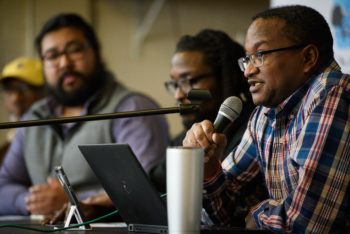
Moderator and Fayetteville Observer opinion editor Myron Pitts speaks at Community Conversations: A Panel Discussion. (Paul Woolverton/The Fayetteville Observer)
5. Meeting with leaders in the Black community: Ahead of going public with our work, Opinion Editor Myron Pitts and I scheduled a meeting with leaders in the Black community to talk to them about the work we had been doing and to get their feedback on where we could improve. We found what they shared to be so valuable that it led to more focused, intensive diversity training. Several of us recently went through the Groundwater Presentation conducted by the Racial Equity Institute. In this training, we learned just how pervasive systemic and institutional racism is in the U.S. We took what we learned back to the rest of the staff and conducted our first brainstorming session geared toward stories that examine the causes and effects of systemic racism in Fayetteville and Cumberland County. A recent story on the homeownership gap between Black and white residents in Fayetteville came from that session.
6. Recruiting and hiring: We know that our coverage of this community is stronger when our newsroom more closely resembles the diversity of people who live here. We had made great strides at increasing diversity in our newsroom. As reporters have left and positions have been eliminated, however, maintaining that diversity has been a challenge. Even still, we ensure that we interview a diverse range of candidates for any of our job openings.
Q: What advice would you give to others who hope to repair their relationship with underserved members of the community?
A:
Listen: It seems like such an obvious thing to do, but journalists often fall into the trap of thinking that we know more than our readers. We don’t. We’ve started writing more about Black excellence, and that is a direct result of hearing time and again from our partners and other people we’ve met over the past year that they wanted to see that content from us. We were hesitant at first to ramp up our positive story coverage when we know crime and other bad news often receives the most readership. But we were pleasantly surprised to see that there is a larger audience for these types of stories.
We routinely far surpass what our company benchmarks are for an everyday win and in some cases surpass what we consider a big win. Here are three examples of stories that had more than five times the pageviews of an everyday win, and in some cases more than twice what we consider a big win:
- Fayetteville State University graduates who went on to experience success;
- A Fayetteville caterer who won North Carolina Mother of the Year;
- Our area’s first Black barbecue cook-off; and a student who received national recognition.
There are plenty of examples, but those are particularly notable for getting the same kind of attention normally reserved for high-profile murders or crime.
Make the first move: You have to be the one to reach out. Recognize that the onus is on you to start the process of rebuilding relationships.
Admit your mistakes: The mistakes might not have happened on your watch, but the acknowledgment of past wrongdoing goes a long way toward building trust.
Show up: We often attend events or gatherings regardless of whether we’ll be writing a story about it. People see us in the community, they notice we’re paying attention and they appreciate it. It is also a great way to meet people and gather contacts and business cards for future stories, which has paid off for us dozens of times and in multiple ways already.